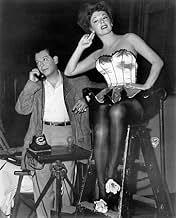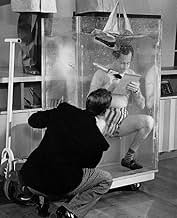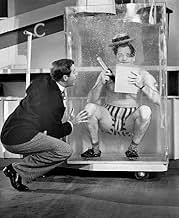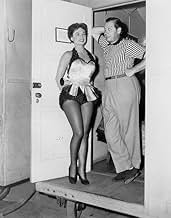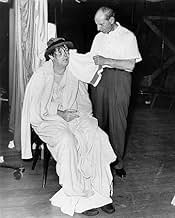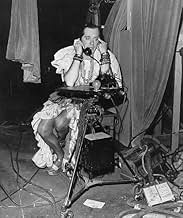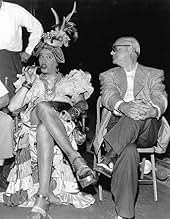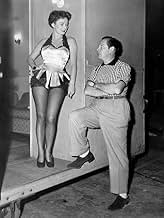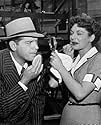Ajouter une intrigue dans votre langueA young comic plays second-rate nightclubs and chintzy resorts in his struggle to break into the big time.A young comic plays second-rate nightclubs and chintzy resorts in his struggle to break into the big time.A young comic plays second-rate nightclubs and chintzy resorts in his struggle to break into the big time.
Richard Avonde
- Minor Role
- (uncredited)
Edward Biby
- Smoker
- (uncredited)
Avis en vedette
There are a couple of reasons why lovers of musicals on the silver screen might want to watch this old stinker, none of them having to do with its quality as a film. One is the musicals numbers themselves, of which there are many, including great old standards by Harry Warren and George Gershwin. The other is to watch the unbelievably corny shtick performed by Milton Berle and Bert Lahr. It's hard to explain Berle's popularity as a television pioneer; his jokes and routines reek of someone who wants to be the life of the party but ends up being just annoying.
I happened upon this film by accident whilst I was channel surfing. Having never seen "Uncle Milty" in an acting role before I just had to stop and watch.
While this films story is one of those behind the scenes show biz stories of a comic trying to get into the big time, what I found to be absolutely fascinating was the character of Rene played by Iphigenie Castiglioni in what can only be read as a very, very lesbian night club owner for whom Berle auditions doing a comedic routine playing the piano and singing Miss Otis Regrets, a song written by the very gay Cole Porter.
The nightclub owner Rene with her mannish hairstyle, tuxedo (worn during the day!) and long, long cigarette holder with her aperitif is the quintessential gay stereotype for the era. How the combination of Rene in her garb and the suggestive Cole Porter song got past the censors is beyond me, but I am sure it was quite appreciated by gay audience members as an acknowledgment of their presence in show business.
While this films story is one of those behind the scenes show biz stories of a comic trying to get into the big time, what I found to be absolutely fascinating was the character of Rene played by Iphigenie Castiglioni in what can only be read as a very, very lesbian night club owner for whom Berle auditions doing a comedic routine playing the piano and singing Miss Otis Regrets, a song written by the very gay Cole Porter.
The nightclub owner Rene with her mannish hairstyle, tuxedo (worn during the day!) and long, long cigarette holder with her aperitif is the quintessential gay stereotype for the era. How the combination of Rene in her garb and the suggestive Cole Porter song got past the censors is beyond me, but I am sure it was quite appreciated by gay audience members as an acknowledgment of their presence in show business.
The comedy giants of the black and white era film. Uncle milty. Bert lahr. Alan hale, who must have been in every single movie made before 1950. The top actresses of the day virginia mayo, ruth roman. Kip ( milton berle) is trying to book somewhere, anywhere, but ... he's past his prime, and all his gags are old, dusty vaudeville bits. Television killed off vaudeville way back when. Even one of the agents says "this kind of thing went out ten years ago." there's some funny stuff in here, done by the pro's, but it won't be for everyone. Some fun guests, and many references to other performers. Unfortunately, he does blackface, a reference to al jolson. Possibly the last time it was done in the movies. Fountain pens? Just shows how old the material really was. The story is pretty silly, but we do get to see milty doing comedy. And drag. He did mostly television after this. Directed by roy del ruth, who had started out with the genius mack sennett. Del ruth has an interesting story detailed on wikipedia dot org; he worked with all the greats.
Robin Williams, Tom Hanks, and Jack Lemon. I bet you can think of others.
Unfortunately, Berle ain't one of them. Bert Lahr doesn't do so well either.
It is great to see some of his old acts but some of them don't hold up.
Unfortunately, Berle ain't one of them. Bert Lahr doesn't do so well either.
It is great to see some of his old acts but some of them don't hold up.
A small-time comic works his way up to the big time.
The two hours is mainly for fans of Uncle Miltie. Berle is in just about every scene, along with a number of his costumed skits. As expected, some skits are funnier than others; however, I wish this overlong movie had stayed on a light comedic level. Instead, it veers off near the end into heavy drama, which could have been easily lopped off.
Catch that bouncy opening—as I recall, it plays much like Berle's hit TV show that helped put TV on the map in the early days. Anyway, if guys get tired looking at the star, there's the delectable Ruth Roman standing around in various stages of undress, and also a shapely Virginia Mayo doing some surprisingly good dance steps. Comic actor Bert Lahr gets his turn on the stage. But to me, his brand of humor is a matter of taste.
I suspect Warner Bros. was testing the waters to see if Berle's appeal carried over to movies as well as TV, in the way it did for Bob Hope over at Paramount. However that may be, I think the movie would be better if shorter and strictly light-hearted.
The two hours is mainly for fans of Uncle Miltie. Berle is in just about every scene, along with a number of his costumed skits. As expected, some skits are funnier than others; however, I wish this overlong movie had stayed on a light comedic level. Instead, it veers off near the end into heavy drama, which could have been easily lopped off.
Catch that bouncy opening—as I recall, it plays much like Berle's hit TV show that helped put TV on the map in the early days. Anyway, if guys get tired looking at the star, there's the delectable Ruth Roman standing around in various stages of undress, and also a shapely Virginia Mayo doing some surprisingly good dance steps. Comic actor Bert Lahr gets his turn on the stage. But to me, his brand of humor is a matter of taste.
I suspect Warner Bros. was testing the waters to see if Berle's appeal carried over to movies as well as TV, in the way it did for Bob Hope over at Paramount. However that may be, I think the movie would be better if shorter and strictly light-hearted.
Le saviez-vous
- AnecdotesThe "Fountain Pen Sketch" was taken from the hit musical "Make Mine Manhattan" that opened in New York on 15 January 1948 at the Broadhurst Theatre, 235 W. 44th St. and ran for 429 performances, and starred Sid Caesar. Max Showalter, who performs that specialty number in this movie, was also in that opening night cast playing the same role, as well as others.
- GaffesAfter Kip meets with Eagen, a brief clip is shown of a train heading to Boston, with a Southern Pacific locomotive. The Southern Pacific Railroad served California and the south west, and would not have gone to Boston or anywhere in the northeast.
- Citations
Monte Wilson: [Checking out Kip's suit] Very conservative.
Kipling 'Kip' Cooper: Conservative? Why it could be elected on a Republican ticket without anyone in it.
- ConnexionsReferenced in Texaco Star Theatre Starring Milton Berle: Episode #2.11 (1949)
- Bandes originalesAlways Leave Them Laughing
(1949) (uncredited)
Written by Sammy Cahn and Milton Berle
Sung during the opening credits and first scene by Lynn Davis, Lorraine Crawford,
Flo Farmer, Mary Castle, Alice Wallace and Nita Talbot
Reprised by them with Milton Berle at the end
Variations in the score throughout
Meilleurs choix
Connectez-vous pour évaluer et surveiller les recommandations personnalisées
Détails
- Date de sortie
- Pays d’origine
- Langue
- Aussi connu sous le nom de
- The Thief of Broadway
- Lieux de tournage
- 1655 Broadway, Manhattan, Ville de New York, New York, États-Unis(Lindy's Restaurant, exterior)
- société de production
- Consultez plus de crédits d'entreprise sur IMDbPro
- Durée1 heure 56 minutes
- Couleur
- Rapport de forme
- 1.37 : 1
Contribuer à cette page
Suggérer une modification ou ajouter du contenu manquant

Lacune principale
By what name was Always Leave Them Laughing (1949) officially released in India in English?
Répondre

